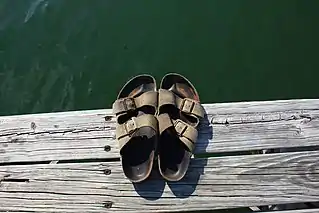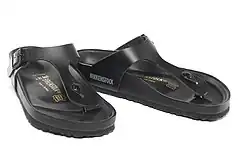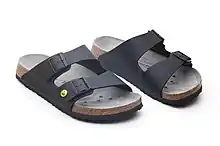Birkenstock
Birkenstock Holding plc is a German shoe manufacturer known for its sandals and other shoes notable for contoured cork footbeds (soles) made with layers of suede and jute, which conform to the shape of their wearers' feet. Founded in 1774 by Johann Adam Birkenstock and headquartered in Neustadt (Wied), Rhineland-Palatinate, Germany, the company's original purpose was to create shoes that support and contour the foot, compared to the flat soles of many shoes during that time. In 1896 the Fussbett (footbed) was designed, and by 1925, Birkenstocks were sold all over Europe.
Logo | |
| Formerly | Birkenstock Group B.V. & Co. KG |
|---|---|
| Type | Public limited company |
| NYSE: BIRK | |
| Industry | Shoe manufacturing |
| Founded | 1774 |
| Founder | Johann Adam Birkenstock |
| Headquarters | , Germany |
Key people |
|
| Products | Shoes |
| Revenue | |
| Total assets | |
| Total equity | |
| Owner | L Catterton (83%) |
Number of employees | c. 6,200 (2023) |
| Website | birkenstock-group |
| Footnotes / references [1] | |
In 1966, Margot Fraser first brought Birkenstocks to America. In the US, they were sold in health stores, thus becoming associated with hippies in the 1970s.
History
Early years

The Birkenstock brand traces its roots to Johann Adam Birkenstock, registered in 1774 as a "vassal and shoemaker" in local church archives in the small Hessin village of Langen-Bergheim. In 1896, Johann's great-great-grandson Konrad Birkenstock developed the first contoured insole for use by shoemakers in the production of custom footwear.[2][3] Also in the year 1896, Konrad created the Fussbett (footbed) and opened two shoe stores in Frankfurt, Germany, where he continued to make and sell his insoles.[4][5] The Birkenstock company created many educational courses to help spread awareness of the benefits of its shoes; in 1947, Konrad's son, Carl Birkenstock, wrote the book "Podiatry-The Carl Birkenstock System"—one of many books released by Birkenstock. The year 1902 saw the development of the first flexible arch-support for insertion into factory-made shoes, and in 1964, Karl Birkenstock developed these inserts into a shoe — thus producing the original prototype of the Birkenstock sandal. In 1925 Konrad Birkenstock expanded the company by buying a large factory in Friedberg, Hesse. After World War II (1939–1945), the Birkenstock sandal was popular among returning soldiers because of the orthopedic support.[6] Starting in 1963 and continuing into 1964 Karl Birkenstock released his first athletic sandal with a flexible footbed called Madrid. The shoe was constructed so that the wearer would have to grip their toes to keep the sandals on; this resulted in toning the calf muscle,[7] which became quite useful to athletes, especially among gymnasts.[8]
Margot Fraser and introduction to U.S.

In 1966, Margot Fraser, a German dressmaker who resided in Santa Cruz, California, decided to travel back to Germany to visit a spa in Bavaria, where she was recommended Madrids to help with a foot ailment caused by tight shoes.[7][9][10] Due to Fraser's relief from her foot condition and her enthusiasm for the sandals, Birkenstocks were introduced in the United States—though some hurdles stood in the way of their eventual acceptance by American buyers. Many shoe stores rejected the sandals due to their appearance, leading Fraser to health stores near the granola section.[11] The 1970s brought a spike in sales. In the United States, Birkenstocks were first popular among young men and later on among flower children, a group traditionally associated with American liberalism. The shoe became popular with hippies and others who had a "back to nature" philosophy and appreciated the natural foot shape and foot-friendly comfort of Birkenstocks.[12] In 1973, Birkenstock's most popular sandal, Arizona, was introduced.[13]
Expansion and present-day
Fraser founded a trading company named Birkenstock Footprint Sandals, Inc., in Novato, California. Renamed Birkenstock Distribution USA, Inc. (BDUSA) in 2005, the company remained until 2007 the exclusive importer and distributor of Birkenstock name-brand products in the United States. In 2007 the owners of Birkenstock Orthopädie GmbH & Co. KG purchased their long-standing distribution partner BDUSA.[14]
In 1986 Nordstrom became the first department store to sell Birkenstock sandals.

In the early 1990s, "Birks" enjoyed another spike in sales among high-school and college-aged Generation Xers, in part due to the introduction of Birkenstocks into High Fashion, most notably, Kate Moss. Birkenstocks continued to spread to Britain in the early 2000s due to headlines of Gwyneth Paltrow, who was spotted wearing them.[15] Birkenstocks saw another comeback among teens and young adults in the early 2010s, as well as in the late 2010s due in part to the VSCO girl trend.[16] The company was given PETA's Libby Award for being the "Most Animal-Friendly Shoe Company" in 2018.[17]
After Karl Birkenstock retired from the company in the early 2000s, his three sons, Christian, Stephan, and Alex Birkenstock, took over management and ownership. Each of them had different ideas for the company's future and ended up creating multiple competing product lines and subsidiaries. In 2013, Stephan sold his stake to the two brothers; they recruited Oliver Reichert, an outsider, to consolidate various subsidiaries into Birkenstock Group and lead the company.[7][18][19]
In February 2021, L Catterton, the private equity firm backed by Bernard Arnault's LVMH, said it had agreed to buy Birkenstock in a deal that valued the company at about €4bn.[20] Christian and Alex Birkenstock retained minority ownership and remained responsible for production in Germany.[21]
In September 2023, Birkenstock filed for an initial public offering (IPO) in the United States stating that the company would be listed on the New York Stock Exchange under the stock ticker "BIRK".[22][23] The company completed the IPO and went public on 11 October 2023 raising US$1.48 billion valuing the company at $8.64 billion. Following the IPO, L Catterton continued to be a controlling shareholder with 83 percent ownership.[24] Alex exited his stake following the IPO.[25]
As of 2023, 72 percent of their customers were female.[26]
High fashion
In 2012 Birkenstocks were spotted on a Céline runway in Paris. Called "Furkenstocks", this recreation of the Arizona sandal incorporated a mink-covered footbed. Many other designers have also created their version of the sandal, including Giambattista Valli and Givenchy.[7]
In 2019 Valentino collaborated with Birkenstock to create their version of the sandal featured at Men's Paris Fashion Week.[27]
On June 3, 2021, the Birkenstock Group announced a collaboration with fashion designer Rick Owens.[28] Starting on June 4 of that year, interpretations of the Arizona and Boston models were released. A new Rotterdam style was also presented and released for sale.
Production

The original footbed of the Birkenstock shoe was created in the 1930s and possesses four different layers that complete the shoe. The first layer of the shoe is the shock-absorbent sole, followed by a layer of jute fibers, a firm cork footbed, and another layer of jute. The last layer is the footbed line which is a soft suede.[29]
In addition to the original footbed, Birkenstock gives the option of a soft footbed. The shoe is made of the same materials as the original footbed, with the addition of a foam insert placed under the suede lining.[30]
In 2015, Birkenstock introduced a lightweight, waterproof shoe called the Birkenstock EVA, made of a material called ethylene-vinyl acetate (EVA).[31][32]
References
- "Birkenstock Holding plc Registration Statement (Form F-1/A)". US Securities and Exchange Commission. 4 October 2023.
- Odriozola, Amaia (6 October 2023). "Birkenstock goes public: This is how the 'woke' sandal became a fashion symbol". El Pais.
- "How Birkenstock went from 'ugly' sandal to trendy fashion staple: the popular German LVMH-owned footwear brand elevated its status with Barbie, Kendall Jenner and collaborations with Valentino". South China Morning Post. 11 August 2023.
- Jennings, Helen (14 August 2020). "The secret of Birkenstock's enduring success". CNN Style.
- "History: Birkenstock Group". www.birkenstock-group.com. Retrieved 25 April 2017.
- e.V., Deutsche Zentrale für Tourismus. "Johan Adam Birkenstock". www.germany.travel. Retrieved 25 April 2017.
- Mead, Rebecca (16 March 2015). "Sole Cycle". The New Yorker.
- "Walking History – the one-strap Madrid sandal". Birkenstock Group. Retrieved 16 November 2020.
- Groves, Martha (20 February 1990). "Footwear's Ugly Duckling Grows Up : Fashion: Clunky Birkenstock sandals were part of the 1960s counterculture. Now their U.S. distributor hopes some stylish updating will broaden their market appeal in the 1990s". Los Angeles Times.
- "Talk with founder and former CEO of Birkenstock, Margot Fraser". 7 April 2010. Archived from the original on 26 April 2017. Retrieved 25 April 2017.
- Horyn, Cathy (20 August 2018). "Cathy Horyn Travels to Germany to Understand the Unlikely Return of Birkenstocks". The Cut. Retrieved 16 November 2020.
- Carr, Collie (12 March 2006). "Thank You for Insulting Our Sandals". The New York Times. Accessed 7 May 2012.
- Cary, Alice (3 June 2023). "How Birkenstock's Arizonas Went From Being Sold Exclusively In Health-Food Stores To A Fashion Editor Staple". British Vogue.
- "History: Birkenstock Group". www.birkenstock-group.com. Retrieved 16 November 2020.
- Helen Jennings. "The secret of Birkenstock's enduring success". CNN. Retrieved 16 November 2020.
- Wu, Jasmine (9 September 2019). "Teen culture shifted to embrace brands, and the VSCO girl was born". CNBC. Retrieved 28 October 2020.
- Barbara Schneider-Levy,"Birkenstock Is Voted Most Animal-Friendly Shoe Company by PETA’s Youth Group," FootwearNews.com, 14 February 2018.
- Debter, Lauren (2 March 2021). "Birkenstock Billionaires Unveiled After German Sandal Maker Agrees To Sell In A $4.7 Billion Deal". Forbes.
- Paton, Elizabeth (11 October 2023). "From LSD to I.P.O." The New York Times.
- Zlaty, Hanna (26 February 2021). "Birkenstock sold to group backed by Europe's richest man". CNN Business.
- Butler, Sarah (26 February 2021). "German sandal maker Birkenstock taken over by LVMH-backed group". The Guardian.
- Pequeño IV, Antonio (12 September 2023). "Birkenstock Files For IPO Two Years After Its $4.3 Billion Acquisition". Forbes.
- Saini, Manya; Nishant, Niket; Saini, Manya; Nishant, Niket (2 October 2023). "Germany's Birkenstock targets $9.2 billion valuation in New York IPO". Reuters. Retrieved 2 October 2023.
- Gould, Ryan; Hytha, Michael (10 October 2023). "Birkenstock Prices IPO Within Range at $46 a Share". Bloomberg News.
- Stupples, Ben; Maloney, Tom (11 October 2023). "Birkenstock heirs are now worth $3.4 billion after the 250-year-old shoemaker's high-profile IPO". Fortune.
- Wood, Zoe (9 October 2023). "From frumpy sandal chic to mainstream appeal: will Birkenstock IPO be a perfect fit?". The Guardian.
- Klerk, Amy de (17 January 2019). "Valentino has given Birkenstocks a high-fashion spin". Harper's BAZAAR. Retrieved 18 November 2020.
- "Birkenstock and Rick Owens Continue Their Partnership for a Third Season" (Press release). Birkenstock Group. Retrieved 29 July 2021.
- "Our Footbed". www.birkenstock.com. Retrieved 7 May 2017.
- "A fascinating insight into the soft footbed by Birkenstock". Daily News and Analysis. 7 February 2022.
- Dawkins, Jennifer Ortakales (4 October 2023). "The rise of Birkenstock: How the shoe brand turned an ugly hippie sandal into coveted fashion statement and has now filed for an IPO". Business Insider.
- "BIRKENSTOCK Footwear: Birkenstock Group". www.birkenstock-group.com. Retrieved 13 November 2020.